Dice are also people in this unusual city builder I've been obsessively playing
In Dice Legacy, your dice are peasants, scholars, soldiers, and merchants. And sometimes they even gain superpowers.
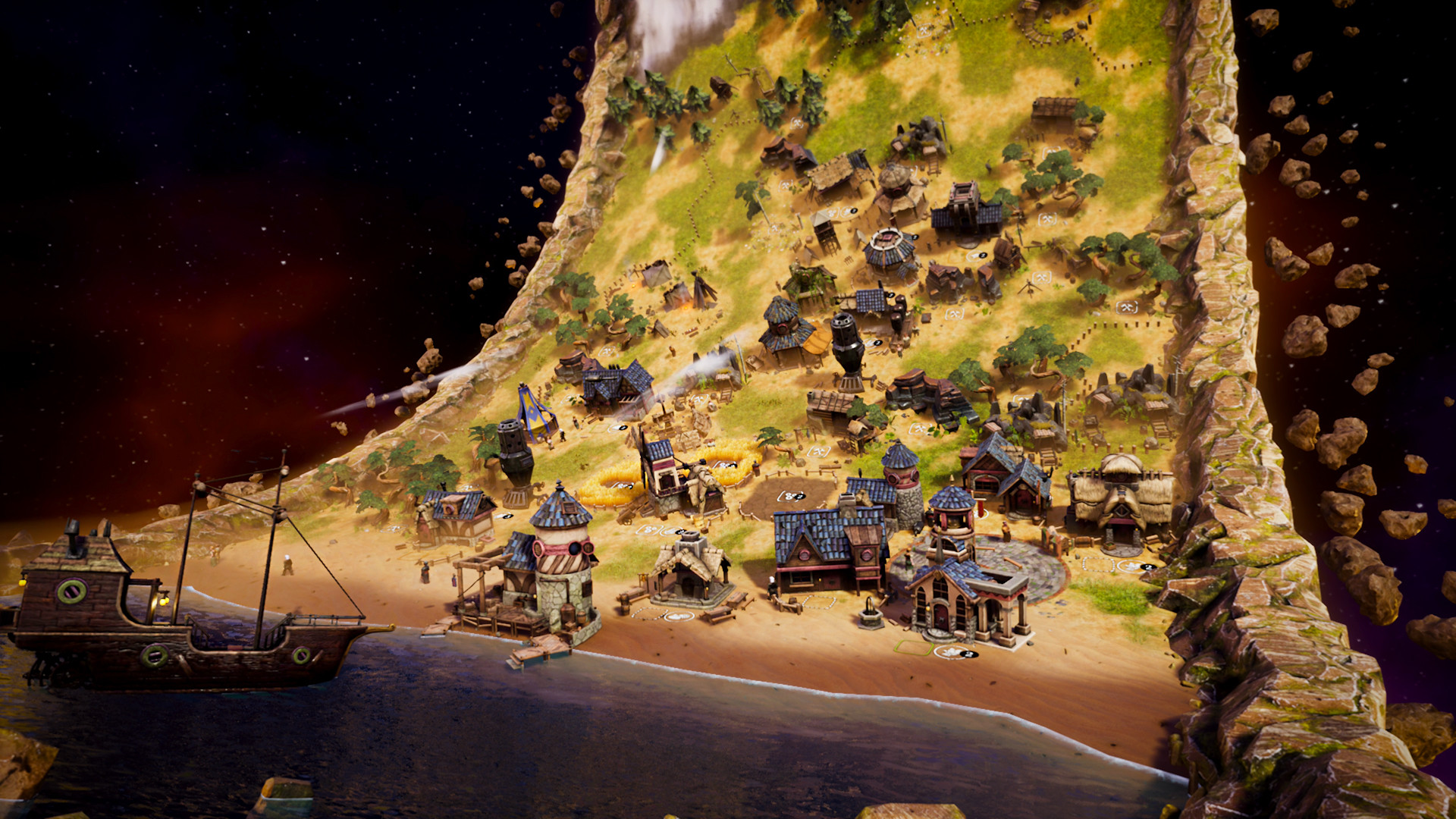
Dice Legacy is an unusual game in an even more unusual setting. It takes place on a strange medieval ringworld floating through space. It's a dice-rolling game but it's also realtime (with pause). It's a city builder, roguelite, colony management game, and a survival game rolled up in one.
Most unusually, your dice aren't just dice, they're your citizens. You have to keep them healthy by feeding and healing them, and keep them warm in winter with a cozy tavern and a Frostpunk-like furnace. And above all else you need to keep them happy or they'll turn on you and burn your city to the ground.
That's a lot to grapple with, so I'll lay out the basics of how Dice Legacy works based on the preview build I've been playing obsessively for the past week. Your creaky wooden sailing ship (which is on wheels, by the way) crosses the ringworld's shallow ocean to a new continent, most of which is shrouded in fog. Lurking somewhere in the mist is a mysterious and extremely hostile faction known as The Others, who aren't at all happy that you've landed on their shores and will periodically send warriors your way to attack the structures you build.
You begin with a handful of dice, each which represents a citizen. Initially, they're all peasants, and each side of a peasant die shows the action the die can perform: a sword for combat, tools for gathering, a hammer for building, gears for working, and an eye for exploration. To use a die, you drop it on a node bearing that symbol. A peasant die with a gathering symbol can be placed in a forest or meadow to gather wood or herbs, a hunting ground to collect food, or a mine to produce stone or iron.
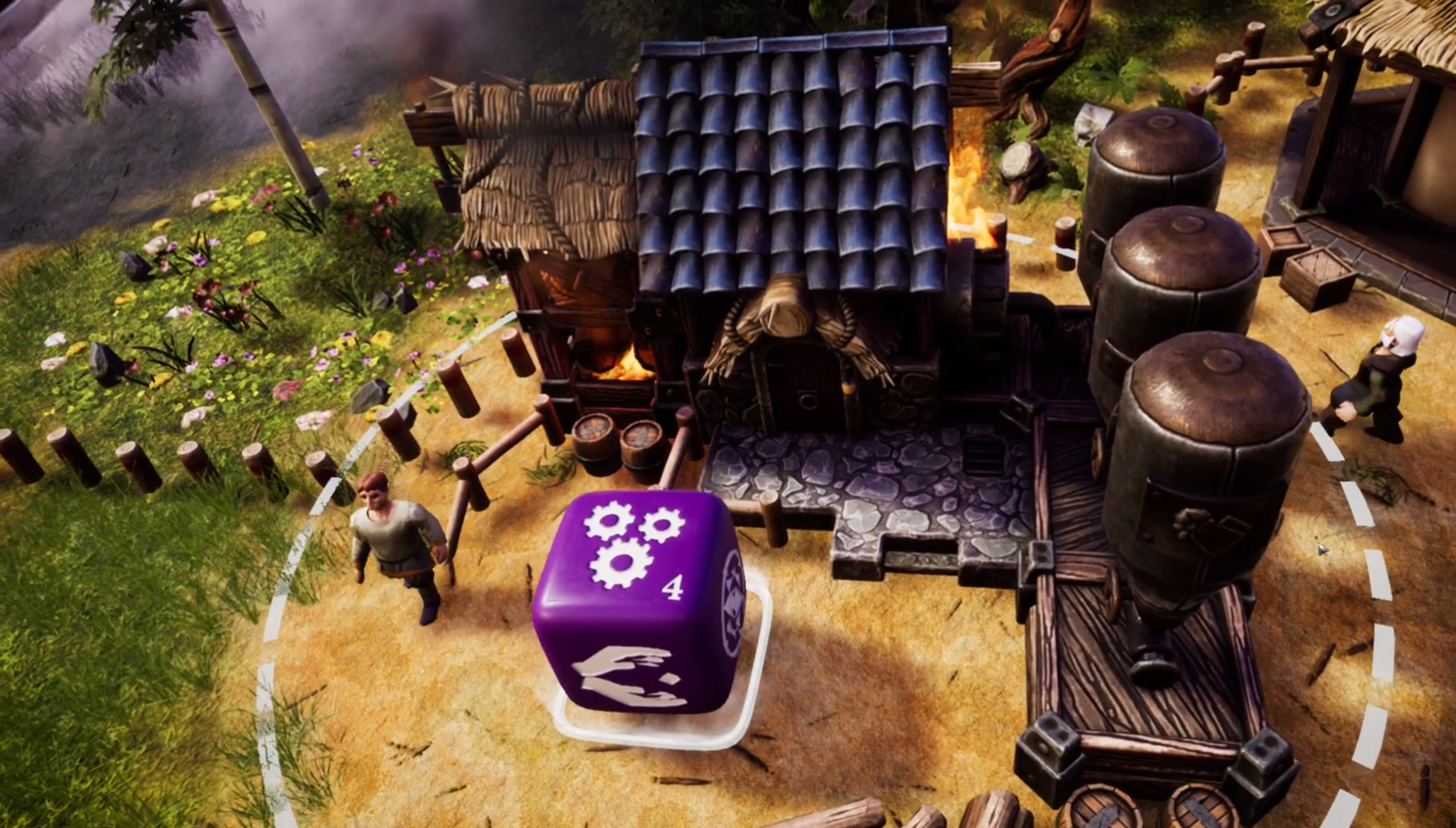
Some nodes require multiple dice at the same time—to erect a new building, for example, you'll often need to place two or three dice displaying hammers. Sometimes you combine a die with a resource—if you build a brewery, you can drop in a peasant die with a working face along with two units of wheat to produce ale.
Once a die has performed an action, which takes time, it'll return to your hand exhausted, and you'll need to roll it to use it again.
Rolling a die refreshes the dice face, but each roll also lowers its durability by 1. Dice begin with 16 durability, but if they get down to zero and are rolled again, they'll perish (though you can create a new die by putting two peasants in a house together). Plopping a die in a cookhouse and giving it a plate of food will restore some durability, but throughout the game you'll constantly be faced with the threat of die death.
Keep up to date with the most important stories and the best deals, as picked by the PC Gamer team.
The early game is mostly about rolling your dice to get the faces you need to gather as many resources as you can as quickly as you can. There are two seasons in Dice Legacy, summer and winter, and winter can result in your dice freezing into ice cubes. A frozen die can't be rolled or used until it's thawed with ale in a tavern, so winters are especially perilous. You need wheat to make ale, and wheat can't be grown in the winter, so if you haven't prepared properly you can wind up with a handful of dice you can't do a damn thing with until summer rolls around again. Summer in Dice Legacy is a frantic gathering binge, and winter is a tense balancing act.
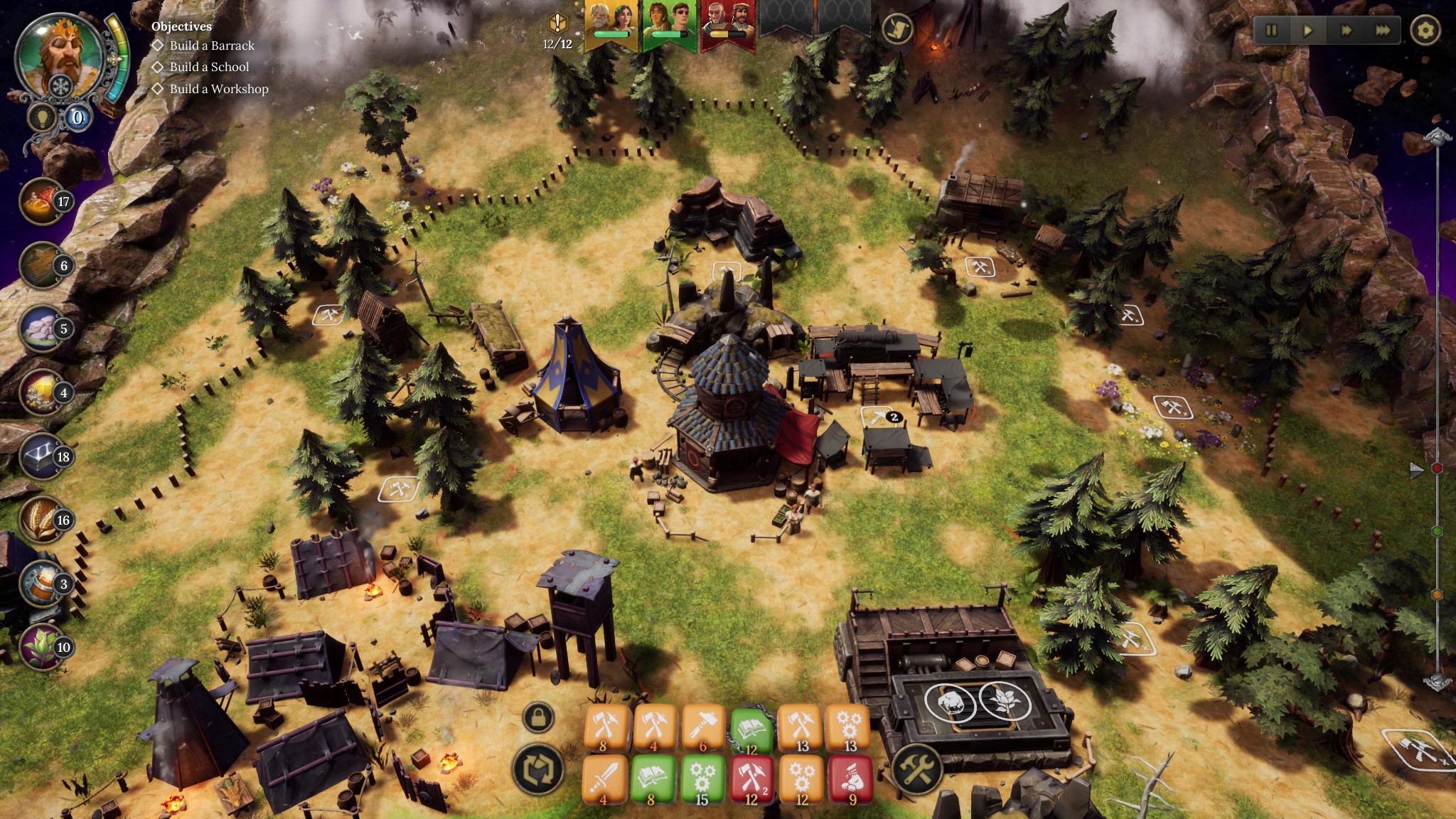
But there's more. Lots more. Your dice also have a happiness meter, and this is related to their dice class. You begin with only peasants, but as you collect resources and build structures, you can upgrade your dice into new classes. A school can turn a die from a peasant into a citizen, with some new die faces like research, which can be undertaken in a workshop to unlock tech trees. A military academy can turn peasants into warriors who don't just fight invading Others but can destroy enemy buildings with a new die face that represents raids. A merchant's guild can turn peasants into tradesmen who can barter with factions you'll meet as you uncover more of the ringworld map, and a monastery can produce monks who can cast blessings on other dice.
But with only a maximum of 12 dice to work with, balancing the classes is tough, especially since they all seem to hate each other. Turning a bunch of peasants into soldiers will please the soldier class but lessen the happiness of the peasant class, since there are now fewer peasants. Build too many citizen districts and the other classes will grow unhappy. Each season you pick a new law to pass, Frostpunk-like, and laws that favor one class will drop the morale of the rest of the classes.
So you're not just balancing resource gathering and consumption, but the mood of your various dice classes. In my first game of Dice Legacy, The Others overwhelmed me with attacks and burned down my city. In my second game my own peasants did the work for them. I'd given soldiers and merchants lots of districts and policies because I wanted to focus on raids and trade, and my peasants revolted, rioted, and burned my city down. The most dire threat in Dice Legacy isn't The Others, it's having your society turn on itself.
All of this makes Dice Legacy an extreme balancing act. Throughout the campaign you need to focus on the base act of gathering enough resources to keep your dice warm and healthy. But you need to also constantly be expanding your territory because resource nodes eventually deplete. You need to focus on creating new classes and buildings that cater to them, but you also need to focus on keeping the other classes happy which means not focusing on any one class too much. It can be supremely challenging at times, but it's also intensely satisfying to survive a harsh winter with all your dice intact or manage a bunch of different classes while still keeping them happy, or at least stopping them from being completely enraged.
A few hours into my only successful campaign so far, I did find a lovely sweet spot where I could relax a bit and do some genuinely cool stuff with my dice. Research had unlocked most of the tech trees allowing more efficient gathering, so I was flush with resources. I unlocked an enhancement chamber where I could increase the power of my dice and a forge where I could combine two dice into a single, more powerful die with boosted stats. My die became half merchant, half scholar, and could harvest wheat with the strength of two peasants.
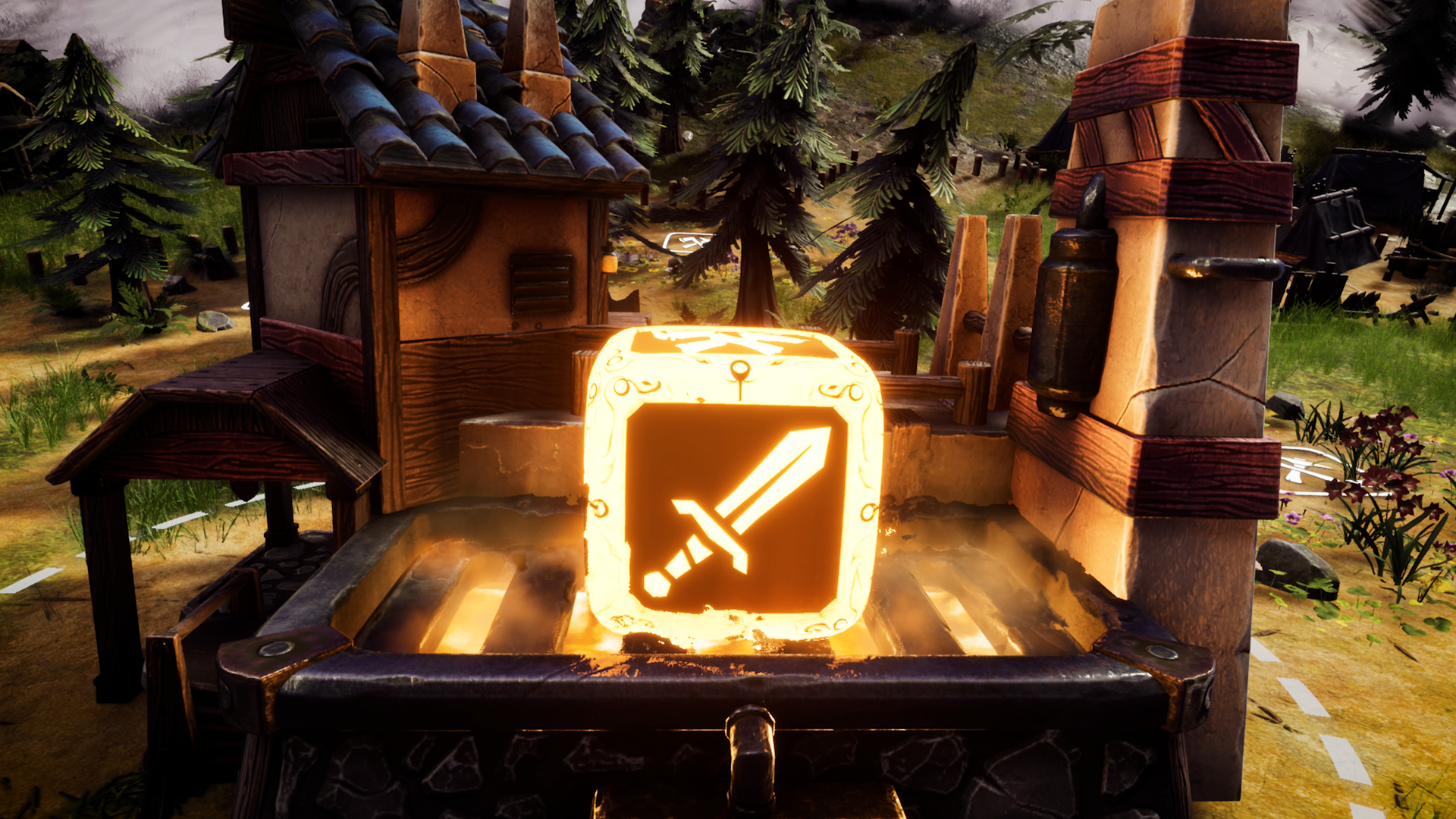
I even unlocked the ability to perform experiments on my dice, which resulted in a couple of awesome randomized powers. One die's durability doubled, and another (my merchant-scholar) became infinitely durable. It would never degrade now matter how many times I rolled it. My lowly peasant die had become a citizen, then a merchant, and then essentially a legit superhero. It's the first time I felt genuine love for an inanimate cube since, well, Portal.
I also got to turn my military into a real force of destruction, upgrading their raiding abilities and building a catapult that let me destroy the Others' buildings from range without having to risk my soldier's health. And I was able to build an obelisk, where I could 'ascend' a die, meaning it would be accessible at the start of my next campaign, giving me an edge when I start over.
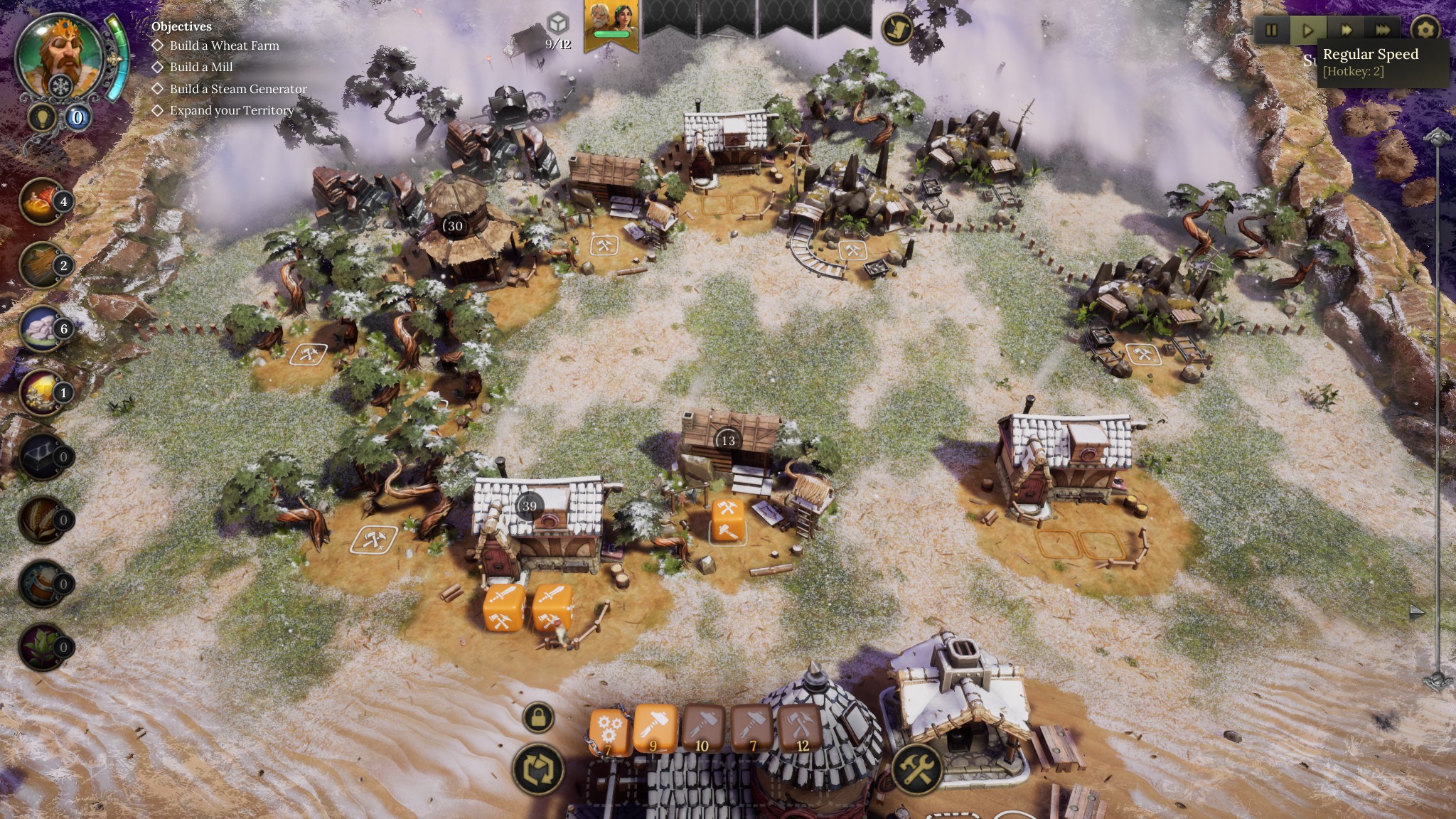
Much as I've been enjoying the challenge of Dice Legacy, I have a couple concerns when it comes to replayability. The early game, where you're just eking by with a few scraps of wood and a few bars of iron, is a bit sluggish—it's at least an hour or so before I'm able to start unlocking the technology that makes the game really come alive. Spending a couple hours doing little but dropping peasants onto forest and mining nodes, restoring them with food when they degrade, over and over again, is a bit of a grind. Most colony management games let you set a citizen into a routine where they can work without you having to tell them. Here, you have to manage every single die for every single task. It can get tedious.
But past the opening hour or two of a campaign, Dice Legacy really feels brilliant. It's a challenging resource management game and a supremely tricky balancing act, with a lot of imaginative systems set in a strange and beautiful world.
Plus I dunked my dice in an experimental enhancement chamber, turned one into a superhero, and wound up falling in love with it. How many city builders can manage that? Dice Legacy rolls out in September on Steam.

Chris started playing PC games in the 1980s, started writing about them in the early 2000s, and (finally) started getting paid to write about them in the late 2000s. Following a few years as a regular freelancer, PC Gamer hired him in 2014, probably so he'd stop emailing them asking for more work. Chris has a love-hate relationship with survival games and an unhealthy fascination with the inner lives of NPCs. He's also a fan of offbeat simulation games, mods, and ignoring storylines in RPGs so he can make up his own.

